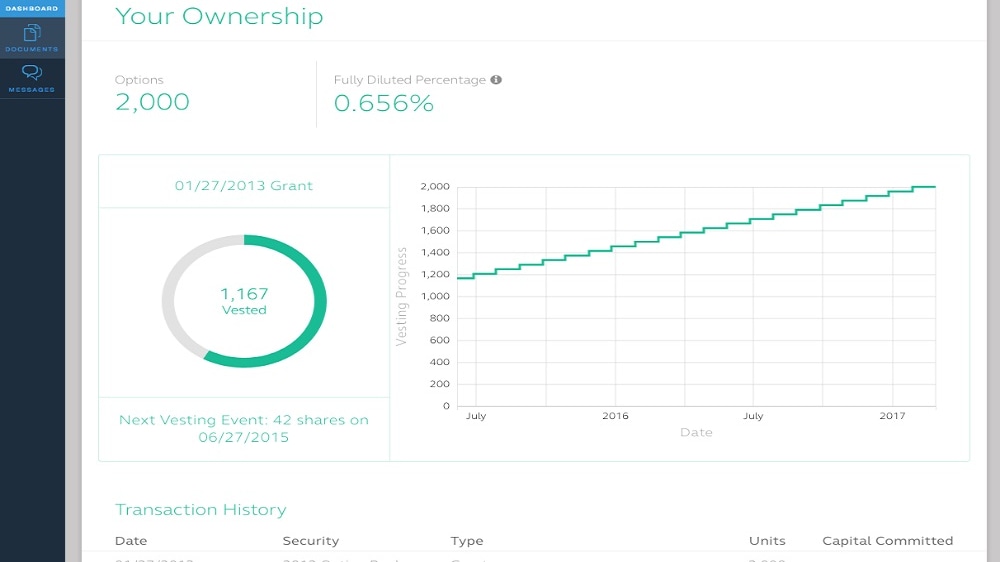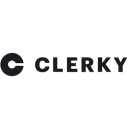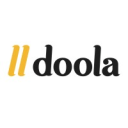Clerky vs Gust: How to choose the right tool for your business
- 01Clerky vs Gust: overview
- 02What's the difference between Clerky and Gust?
- 03Clerky pros and cons
- 04Gust pros and cons
- 05Clerky compared to Gust
- 06Gust compared to Clerky
- 07Features comparison
- 08Clerky vs Gust: Which is the best for your business?
- 09Promotions on Company Formation software
- 10Alternatives to Clerky & Gust
Save up to $100 on Clerky
Save up to $100 on Clerky
Effective legal and compliance management are essential to the success of a startup or a growing business, whether you're handling contracts, equity management, or compliance documentation. You need a reliable platform to streamline your legal processes, securely store important documents, and ensure your company remains compliant with regulations.
That's where legal tech platforms come into play. In this article, we'll compare two prominent players in the legal tech space—Clerky and Gust—focusing on their respective categories of incorporation and equity management. We'll walk you through their primary features and distinctive attributes, helping you make an informed choice based on your startup's specific requirements and budget constraints.
Clerky vs Gust: overview
Clerky and Gust are prominent players in the realm of legal tech platforms, each specializing in distinct categories—incorporation and equity management, respectively. Choosing between these two platforms can be a critical decision for startups and businesses, as it directly impacts their legal and compliance processes.
To simplify your decision-making process, we've developed a comprehensive comparison table that outlines the key attributes of Clerky and Gust. This table employs a rating system and offers detailed insights to provide you with a clear understanding of the strengths and capabilities of each platform.
Whether you prioritize seamless incorporation processes, efficient equity management, compliance support, or other legal-related functions, our comparison will serve as a valuable resource to help you navigate the Clerky vs Gust landscape and select the platform that best suits your specific legal and compliance needs.
What's the difference between Clerky and Gust?


When it comes to legal tech platforms, Clerky and Gust are both well-established players in their respective categories—incorporation and equity management. While they share common objectives of simplifying legal processes for startups and businesses, there are key differences that set them apart.
One significant difference lies in their core focus. Clerky specializes in the incorporation process, streamlining the complex steps involved in forming a new company. It offers a comprehensive suite of tools and templates specifically designed for founders looking to establish their businesses. This includes features like document generation, electronic signature support, and compliance guidance tailored to the incorporation phase.
In contrast, Gust takes a different approach by concentrating on equity management. Gust provides a comprehensive platform for managing equity ownership, cap tables, and investor relations. It's designed to help businesses efficiently handle equity-related tasks, such as issuing stock, tracking ownership changes, and communicating with shareholders. Gust's robust features cater to established companies seeking to manage equity matters effectively.
Another crucial distinction is the scope of their offerings. Clerky excels in providing a streamlined and user-friendly experience for founders during the incorporation process. Its platform is optimized for the early stages of a company's lifecycle, ensuring that all legal requirements are met efficiently. On the other hand, Gust offers a broader set of tools that address ongoing equity management needs, making it an ideal choice for companies at various stages of growth.
Additionally, the pricing models of Clerky and Gust reflect their unique offerings. Clerky typically charges one-time fees for specific legal services related to incorporation. In contrast, Gust employs subscription-based pricing, with plans tailored to the scale and complexity of equity management needs. This difference allows businesses to choose the pricing structure that aligns with their current requirements and budget constraints.
Clerky pros and cons
What are the advantages of Clerky?
- Simplified incorporation: Clerky streamlines the process of incorporating a company, making it easier for founders to navigate the legal requirements associated with forming a new business entity. It provides step-by-step guidance and document templates tailored to each state's regulations.
- Comprehensive document management: The platform offers a centralized repository for all your legal documents. This makes it convenient to store, access, and manage critical documents such as shareholder agreements, bylaws, and stock certificates.
- Electronic signature support: Clerky supports electronic signatures, allowing you to sign and execute important legal documents online. This feature enhances convenience and reduces the need for physical paperwork.
- Compliance guidance: Clerky provides compliance guidance specific to your company's stage and jurisdiction. This helps ensure that you stay in compliance with relevant laws and regulations throughout your company's lifecycle.
- Access to legal professionals: Clerky connects users with experienced attorneys who can provide legal advice and review documents when needed, offering an additional layer of support for complex legal matters.
What are the disadvantages of Clerky?
- Limited to incorporation: Clerky's primary focus is on the incorporation process, so it may not be the best choice if your legal needs extend beyond this initial step. For ongoing legal matters or equity management, you may need to use additional tools or services.
- Cost considerations: While Clerky offers valuable services, it's not the most budget-friendly option for incorporation. Users should be prepared for the associated costs, which can be higher compared to some competitors.
- Not suitable for non-U.S. companies: Clerky is primarily designed for U.S.-based businesses and may not be suitable for international companies or those with complex cross-border legal requirements.
- Limited customization: While Clerky provides document templates, customization options may be limited for users with highly unique legal needs. Some companies may require more tailored legal documents.
- Dependence on legal professionals: While Clerky offers access to legal professionals, some users may find it necessary to engage an attorney for more extensive legal matters, which can result in additional costs.
Compare Clerky to other tools
Gust pros and cons
What are the advantages of Gust?
- Comprehensive equity management: Gust provides a comprehensive suite of tools for managing equity ownership, cap tables, and investor relations. It simplifies complex equity-related tasks, making it a valuable resource for companies with multiple stakeholders.
- Investor communication: The platform facilitates efficient communication with investors, allowing companies to keep shareholders informed, distribute important documents, and handle equity-related inquiries. This is crucial for maintaining positive investor relationships.
- Secure data storage: Gust offers secure and centralized data storage for all your equity-related documents and information. This ensures that sensitive data is stored safely and can be accessed when needed.
- Integration capabilities: Gust integrates with various financial and accounting software, streamlining the process of tracking equity transactions and updating cap tables. This interoperability enhances accuracy and reduces manual data entry.
- Access to investor network: Gust provides access to a network of accredited investors, which can be beneficial for startups seeking funding. It can help companies connect with potential investors and streamline the fundraising process.
What are the disadvantages of Gust?
- Limited legal services: Gust primarily focuses on equity management and investor relations, so it may not offer the comprehensive legal services required for other legal matters, such as incorporation or contract drafting. Users may need to complement Gust with other legal tools or services.
- Pricing structure: The pricing for Gust is subscription-based and can be relatively high for some users, especially smaller startups. The cost may be a factor to consider, particularly for early-stage companies with limited budgets.
- Learning curve: Gust's robust features may have a steeper learning curve for new users. It can take time to fully understand and utilize all the capabilities of the platform effectively.
- Not suitable for all company sizes: Gust is best suited for companies with multiple stakeholders, investors, and complex equity structures. It may be overly sophisticated for very small startups with simple ownership structures.
- International considerations: While Gust is a valuable tool for U.S.-based companies, its services may not be as comprehensive or suitable for international companies with diverse regulatory and compliance requirements.
Compare Gust to other tools
Clerky compared to Gust
Clerky and Gust are both prominent players in the realm of legal tech platforms, specializing in different categories. Clerky excels in simplifying the incorporation process for startups, offering step-by-step guidance, document templates, and compliance support.
On the other hand, Gust focuses on equity management and investor relations, providing comprehensive tools for cap table management and investor communication. While Clerky streamlines the early stages of a company's legal journey, Gust caters to established businesses with complex equity structures.
Is Clerky better than Gust?
Determining whether Clerky is better than Gust depends on your specific business needs. Clerky excels in simplifying the incorporation process for startups, offering guidance and document templates. In contrast, Gust focuses on equity management and investor relations, providing comprehensive tools for cap table management.
If you're in the early stages of your business and need assistance with incorporation, Clerky may be the better choice. However, if your business has complex equity structures and requires robust investor communication, Gust could be the preferred option.
What is Clerky best used for?
Clerky is best used for simplifying the legal processes associated with business incorporation. It excels in guiding startups and small businesses through the complex steps of forming a new company. Clerky provides document templates, compliance support, and electronic signature capabilities, streamlining the incorporation journey. It's an ideal choice for founders and entrepreneurs looking to establish their businesses efficiently and ensure they meet all legal requirements.
While Clerky's primary focus is on incorporation, it may also be valuable for managing some ongoing legal documentation. However, for broader legal needs beyond incorporation, users may need to complement it with additional tools or services.
Can Clerky replace Gust?
Clerky and Gust serve distinct roles in the startup ecosystem, and while both are valuable, they are not direct replacements for each other. Clerky excels in simplifying the incorporation process, offering document templates and compliance support, making it a go-to choice for startups at their inception.
On the other hand, Gust specializes in equity management and investor relations, catering to established businesses with complex ownership structures and investor communication needs. While Clerky and Gust may complement each other's functions in a startup's journey, they are not interchangeable. The choice between them depends on your specific stage and legal or equity management requirements.
Is Clerky cheaper than Gust?
Whether Clerky is cheaper than Gust depends on your specific usage and business needs. Clerky typically charges one-time fees for specific legal services, primarily related to incorporation. In contrast, Gust uses a subscription-based pricing model, with costs varying based on your equity management requirements.
For smaller startups with straightforward incorporation needs, Clerky’s pricing may appear more cost-effective. However, for larger companies or those requiring ongoing equity management and investor relations services, Gust's pricing structure may offer better value. It's essential to consider your specific business requirements and budget constraints when evaluating the cost-effectiveness of these platforms.
Is there a better Company Formation software than Clerky?
Choosing the right legal tech software depends on a thorough assessment of your distinct business requirements and objectives.
While Clerky excels in simplifying the incorporation process, other platforms like Gust offer a more specialized focus on equity management and investor relations. Additionally, you may explore options such as LegalZoom for a broader range of legal services or Carta for in-depth cap table management.
In the end, the ideal choice should closely match your company's precise legal and equity management needs, ensuring a streamlined and efficient approach to legal compliance and ownership tracking.
100$ de réduction sur le Company Lifetime Package on Clerky
Get 100$ de réduction sur le Company Lifetime Package on Clerky and up to $100 savings with Secret.
Gust compared to Clerky
Gust and Clerky are both significant players in the legal tech industry, but they cater to different aspects of a business's legal needs. Gust specializes in equity management and investor relations, offering tools for cap table management and shareholder communication.
On the other hand, Clerky excels in simplifying the incorporation process for startups, providing document templates and compliance support. The choice between Gust and Clerky depends on your specific business stage and requirements. If you need robust equity management and investor engagement, Gust is the way to go. If you're in the early stages and need help with incorporation, Clerky is the better choice.
Is Gust better than Clerky?
Determining whether Gust is better than Clerky depends on your business's specific needs. Gust excels in equity management and investor relations, offering comprehensive tools for cap table management and shareholder communication. It's ideal for established companies with complex equity structures. In contrast, Clerky specializes in simplifying the incorporation process for startups, providing document templates and compliance support.
If you're in the early stages of your business and need assistance with incorporation, Clerky may be the better choice. Ultimately, the decision should align with your unique legal and equity management requirements, taking into account your business's stage and objectives.
What is Gust best used for?
Gust is primarily best used for managing equity ownership and investor relations. This platform is particularly valuable for businesses with complex cap tables, multiple stakeholders, and a need for streamlined investor communication. Gust offers tools to efficiently handle equity-related tasks, including stock issuance, ownership tracking, and communication with shareholders. It helps businesses maintain accurate records, ensure compliance with equity-related regulations, and enhance investor relationships.
While Gust excels in these areas, it may not be the optimal choice for other legal or incorporation needs. Therefore, it is essential to assess your specific business requirements before deciding whether Gust is the right solution for you.
Can Gust replace Clerky?
Gust and Clerky are distinct tools serving different purposes in the startup and legal tech landscape. While Gust excels in equity management and investor relations, offering tools for cap table management and shareholder communication, Clerky specializes in simplifying the incorporation process, providing document templates and compliance guidance.
Therefore, Gust cannot entirely replace Clerky, as their primary functions differ significantly. Startups requiring comprehensive equity management and investor engagement may benefit from Gust, while those in need of streamlined incorporation and legal compliance support should consider Clerky. The choice between them hinges on your specific legal and equity management needs.
Is Gust cheaper than Clerky?
Determining whether Gust is cheaper than Clerky depends on your specific legal and business needs. Gust typically operates on a subscription-based pricing model, with costs varying based on your equity management requirements. In contrast, Clerky typically charges one-time fees for specific legal services, primarily related to incorporation. For startups with straightforward incorporation needs, Clerky may appear more cost-effective.
However, for larger companies or those requiring ongoing equity management and investor relations services, Gust's pricing structure may offer better value. Your choice should align with your precise requirements and budget considerations to determine whether Gust or Clerky is the more cost-effective option.
Is there a better Investment Management software than Gust?
Choosing the right equity management and investor relations software, like Gust, requires careful consideration of your business's distinct requirements and operational preferences.
While Gust is known for its comprehensive features in this domain, alternative platforms like Carta, Ledgy, and Eqvista offer their own unique strengths.
To make an informed decision, assess factors such as the complexity of your equity structure, investor communication needs, and desired integrations. By aligning your specific demands with a software's capabilities, you can identify the ideal solution that optimizes equity management and supports your investor relations efforts effectively.
Features comparison
Clerky Leads in Cap Table Management Over Gust

In the realm of cap table management, Clerky emerges as the superior choice, setting itself apart from Gust with a dedicated tool designed to effectively track ownership stakes, equity distribution, and changes in ownership over time. This robust cap table management feature is notably absent in Gust's offerings, making Clerky the more advantageous tool for businesses intending to maintain a meticulous grip on their capital structure.
Clerky's cap table management capabilities include features like automatic updates, real-time equity tracking, and scenario modeling. Startups can effortlessly manage equity allocation, issue stock, and stay compliant with regulatory requirements. With Clerky's cap table tool, businesses gain the transparency and control needed to make informed decisions regarding equity distribution.
On the other hand, Gust primarily focuses on equity management and investor relations but lacks the specialized cap table management features that Clerky provides. For businesses seeking precise cap table oversight, Clerky's dedicated tool proves invaluable in ensuring accurate and compliant management of ownership data.
Clerky Excels in User-Friendliness Over Gust

When it comes to providing an intuitive, user-friendly experience, Clerky stands out in direct comparison with Gust. With its straightforward and minimalistic interface, users can navigate easily without any specialized knowledge or training. Clerky simplifies complex legal processes by providing templates for standard documents. For example, it offers templates for articles of incorporation, bylaws, and founder stock purchase agreements, which are highly appreciated by startups.
On the other hand, Gust requires a bit more time to become familiar with due to its extensive features and resources. While these resources are valuable, they can sometimes make the platform feel overwhelming for first-time users.
Gust Leads in Integration Versatility Over Clerky

When it comes to integration capabilities, Gust shines brighter in this aspect, offering a diverse range of integration options that set it apart from Clerky. Gust seamlessly integrates with popular platforms like Google Drive, Dropbox, and QuickBooks. For instance, the integration with QuickBooks enables efficient financial management, while Google Drive and Dropbox integrations simplify document sharing and storage. This wide array of integrations empowers startups to centralize their operations, making it easier to share documents, sync crucial information, and manage finances, all under one roof.
On the other hand, Clerky adopts a more streamlined approach, prioritizing the simplicity and effectiveness of its core service – facilitating legal paperwork. While this approach results in a less cluttered environment, it also means that Clerky offers fewer integration options compared to Gust. This limitation may hinder startups looking to streamline their processes through platform integrations.
Clerky Takes the Lead in Compliance Management Over Gust

In the realm of compliance management, Clerky unquestionably outshines Gust, offering startups a comprehensive set of tools to meet their legal and regulatory requirements with ease. Clerky's commitment to compliance is evident in its array of robust features and resources. It not only guides startups through the labyrinth of legal intricacies but also provides ready-to-use templates for essential compliance documents. For instance, Clerky offers templates for privacy policies, terms of service, and user agreements, ensuring that startups can address critical compliance needs effortlessly.
In contrast, Gust does not emphasize explicit features or tools for compliance management. This distinction solidifies Clerky's position as the superior choice when startups are seeking a platform that prioritizes and excels in compliance management.
Gust Offers Superior Team-Building Tools Over Clerky

When it comes to team-building tools, Gust takes the lead with a robust set of features designed to help startups connect with talented professionals and create their dream teams. These comprehensive team-building resources are not specifically available in Clerky, making Gust the preferred choice for startups prioritizing the formation of a strong and dedicated workforce.
Gust's team-building capabilities extend to features such as co-founder searches, investor connections, and job postings. For example, startups can use Gust to find co-founders with complementary skills or connect with potential investors who can provide valuable support. Additionally, the platform allows for job postings, enabling companies to attract top talent and build their teams effectively.
In contrast, while Clerky excels in simplifying legal processes, it doesn't offer the same extensive suite of team-building tools that Gust provides. Therefore, if creating a talented and cohesive workforce is a priority for your startup, Gust proves to be the more fitting choice due to its specialized focus on team-building resources.
Clerky and Gust are Equally Robust for Company Creation

Both Clerky and Gust offer robust support for startups embarking on the journey of establishing their companies. They cater to different facets of this critical process, ensuring that entrepreneurs have the necessary tools and guidance at their disposal.
Clerky specializes in providing comprehensive procedures and information for company creation. It simplifies the intricate steps involved in setting up a business, offering templates and guidance for documents such as articles of incorporation and bylaws. Startups can rely on Clerky to navigate the legal complexities seamlessly, ensuring a strong legal foundation.
On the other hand, Gust's strength lies in providing powerful legal and financial tools that facilitate smooth incorporation and prepare startups for growth. Its offerings extend to equity management, investor relations, and cap table management, streamlining crucial aspects of running a company.
Gust's Market Research Advantage Over Clerky

Gust takes the lead by offering a valuable market research tool, setting itself apart from Clerky. This tool provides startups with access to insightful data and analysis, empowering them to make informed decisions and stay competitive in their respective industries.
Gust's market research tool offers features such as industry trend analysis, competitor insights, and market growth projections. For instance, startups can access data on market trends, potential customer segments, and competitive landscapes. This information enables them to tailor their strategies, identify growth opportunities, and navigate industry challenges effectively.
Conversely, Clerky's primary focus is on simplifying the legal processes for startups, and it does not provide dedicated market research tools. Therefore, if market awareness and data-driven decision-making are priorities for your startup, Gust stands out as the go-to solution for gaining a competitive edge.
Subscribe to our newsletters.
No FOMO here. Stay up-to-date on all the latest deals and news with our monthly newsletter straight to your inbox like 125,000+ entrepreneurs (+ Get 10% off on on our Premium Membership!)
Clerky vs Gust: Which is the best for your business?
Clerky is the best tool for you if:
- You're a startup founder seeking a streamlined and user-friendly platform for hassle-free incorporation.
- You value compliance and need assistance in navigating legal complexities during the early stages of your business.
- You prefer a minimalist interface and readily available document templates to simplify legal paperwork.
- You require efficient electronic signature support and a secure repository for critical legal documents.
- You're focused on establishing a strong legal foundation for your startup and need guidance throughout the incorporation process.
Gust is the best tool for you if:
- You manage a startup with complex equity structures, as it excels in cap table management and equity tracking.
- You prioritize investor relations, offering a robust platform for effective communication with shareholders.
- You need diverse integration possibilities, seamlessly connecting with platforms like Google Drive and QuickBooks.
- You're seeking co-founders, investors, or job candidates, as it provides valuable team-building resources.
- You're an established business looking for comprehensive equity management tools and resources to support growth and compliance.
Alternatives to Clerky & Gust
Promotions on Company Formation software
Start saving on the best SaaS with Secret.
Secret has already helped tens of thousands of startups save millions on the best SaaS like Clerky, Gust & many more. Join Secret now to buy software the smart way.












